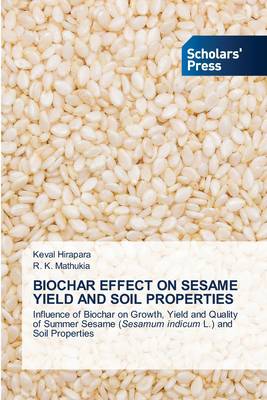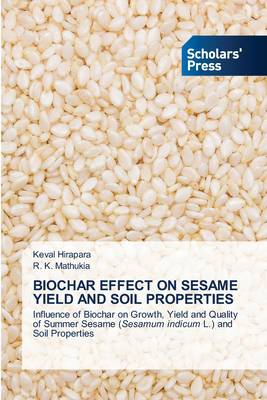
- Afhalen na 1 uur in een winkel met voorraad
- Gratis thuislevering in België vanaf € 30
- Ruim aanbod met 7 miljoen producten
- Afhalen na 1 uur in een winkel met voorraad
- Gratis thuislevering in België vanaf € 30
- Ruim aanbod met 7 miljoen producten
Zoeken
Biochar Effect on Sesame Yield and Soil Properties
Influence of Biochar on Growth, Yield and Quality of Summer Sesame (Sesamum indicum L.) and Soil Properties
Keval Hirapara, R K Mathukia
Paperback | Engels
€ 66,95
+ 133 punten
Omschrijving
Sesame (Sesamum indicum L.) is one of the world's oldest oil crops and has been cultivated in Asia from ancient times with longest history of its cultivation in India. Crop residue management is one of the emerging problems in agriculture sector. Conversion of organic waste to produce biochar is one viable option that can enhance natural rates of carbon sequestration in the soil, reduce farm waste and improve the soil quality. Biochar can effectively improve physical, chemical and biological properties of soil and thereby solve many of the soil limitations. An experiment was conducted on medium black calcareous soil at Junagadh, Gujarat, India. The results indicated that higheryield of sesame in summer season along with improved soil physico-chemical and biological properties can be achieved by application of microbial consortia enriched biochar 0.25 t/ha + vermicompost 1 t/ha or microbial consortia enriched biochar 0.25 t/ha + FYM 1.25 t/ha + vermicompost 0.5 t/ha or biochar 0.5 t/ha + vermicompost 1 t/ha.
Specificaties
Betrokkenen
- Auteur(s):
- Uitgeverij:
Inhoud
- Aantal bladzijden:
- 132
- Taal:
- Engels
Eigenschappen
- Productcode (EAN):
- 9783639516616
- Verschijningsdatum:
- 26/08/2021
- Uitvoering:
- Paperback
- Formaat:
- Trade paperback (VS)
- Afmetingen:
- 152 mm x 229 mm
- Gewicht:
- 204 g

Alleen bij Standaard Boekhandel
+ 133 punten op je klantenkaart van Standaard Boekhandel
Beoordelingen
We publiceren alleen reviews die voldoen aan de voorwaarden voor reviews. Bekijk onze voorwaarden voor reviews.











